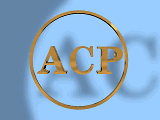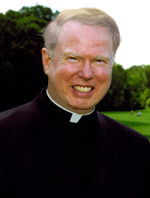Justice Scalia Honored by American Catholic Press
Oct. 12, 2006In The Star
newspaper, John K. Ryan reports on a dinner and lecture, honoring U.S.
Supreme Court Justice Antonin Scalia. According to this reporter,
Justice Scalia is widely known as a conservative interpreter of the
constitution; he relies on the exact meaning of the text itself. The
Justice is also generally acknowledged as extremely intelligent and
articulate. Held at Flossmoor Country Club in Flossmoor, Ilinois, the celebration gave clear evidence of the gifts with which Justice Scalia is endowed, according to Ryan. Justice Scalia spoke on the religious establishment clause of the first amendment to the U.S. constitution. That amendment prohibits any laws made by Congress that would establish a particular religion. In general, said Justice Scalia, this clause expresses what today is called the separation of church and state. On the one hand, the Justice said he was strongly against any establishment of an official religion by the Congress. On the other hand, he also argued that the government need not be neutral with regard to religion. American history abounds with instances of religious influence on the culture. "From abolition to prohibition, the secular arrangements that Americans have voted for, or indeed fought for, have often related to religious beliefs," said the Justice. Justice Scalia emphasized, said Ryan, that this history does not imply any intention to establish a religion. In fact, said Justice Scalia, the separation of church and state is more crucial now than ever before in America: "It is more needful in the American republic than elsewhere because of the sheer diversity of religions here," he said.
Justice Scalia gave numerous examples of mutual influence of religion and government in America. He said that religious thinking and practice often expressed what was taking place in American culture. For example, said Justice Scalia, during the Industrial Revolution in the 1800s, the U.S. put into effect the Calvinist, Protestant ethic of the value of human labor, of dligent work. As socialism became popular during the twentieth century, popular piety became directed to works of charity, of generosity to the poor. In such ways, "the ideas of government have often influenced religion," he said.
There is yet another dimension, the binding character of the law of the state. Scripture speaks to this dimension. As in St. Paul's Epistle to the Romans, it is true that "All authority comes from God." Now, that is certainly lawful authority, said Justice Scalia; it is also clearly the authority of the state. In other words, we have to obey the "powers that be," as the familiar expression puts it, with its origin in the King James Bible translation. In support of this teaching, the speaker referred to the Anglican, C.S. Lewis, who argued that Christians have a moral obligation to turn themselves in when going against the law to pay their "just debt to society."
In conclusion, Justice Scalia quoted Yale law professor Grant Gilmore: "In heaven there will be no law, and the lion will lie down with the lamb. In hell there will be nothing but law, and due process will be meticulously observed." The reporter for this lecture, John K. Ryan, may be reached at [email protected] or (708) 802-8807. For the full text of the original article by John K. Ryan, go directly to The Star.For another report, go to the article by Patty Gayes, from the newspaper of the Archdiocese of Chicago, the New World. Why? Who? What? How to GiveBenefit Archives:1989 1991 1992 1993 1994 1995 1996 1997 1998 1999 2000 2001 2002 2003 2004 2005 2006 2007 2008 2009 2010 2011 2012 2013 2014 2015 2016 2017 2018 2019 2021 2022Copyright © 1999
American Catholic Press. All rights reserved. |
 Justice Scalia stated that this perspective coincides with that of the
Catholic tradition: "Our faith's message is the same as the
Constitution," Justice Scalia said. "State-mandated religion entails
coercion, which is wrong because it suppresses free will." Of its
nature, the virtue of faith must be free; it must be an act deliberately
and voluntarily carried out.
Justice Scalia stated that this perspective coincides with that of the
Catholic tradition: "Our faith's message is the same as the
Constitution," Justice Scalia said. "State-mandated religion entails
coercion, which is wrong because it suppresses free will." Of its
nature, the virtue of faith must be free; it must be an act deliberately
and voluntarily carried out. Reinforcing his arguments, the Justice made specific references to the
New Testament. With regard to the separation of church and state, Scalia
cited the Gospel teaching of Jesus Christ, that is, "Render unto Caesar
the things which are Caesar's; and unto God what is God's." The Justice
suggested that Christ's statement was more than just a "snappy
comeback" to the Pharisees. "It was, to use a modern term, a stopper,"
Justice Scalia said. "Christ said the business of the state is not God's
business. This is not because the state is inherently evil. In the last
analysis, however, the most important objectives of human
existence--goodness, virtue, Godliness and salvation--are not achieved
through the state; and those who seek them there are doomed to
disappointment." It is within the family and similar groups that such
things are sought. These two different realms, said Justice Scalia, are
spoken of in the New Testament as two "kingdoms." This difference was
explicitly brought up by Jesus himself before Pilate. The words of Jesus
were, "It is you who say I am a king. My kingdom is not from here."
Reinforcing his arguments, the Justice made specific references to the
New Testament. With regard to the separation of church and state, Scalia
cited the Gospel teaching of Jesus Christ, that is, "Render unto Caesar
the things which are Caesar's; and unto God what is God's." The Justice
suggested that Christ's statement was more than just a "snappy
comeback" to the Pharisees. "It was, to use a modern term, a stopper,"
Justice Scalia said. "Christ said the business of the state is not God's
business. This is not because the state is inherently evil. In the last
analysis, however, the most important objectives of human
existence--goodness, virtue, Godliness and salvation--are not achieved
through the state; and those who seek them there are doomed to
disappointment." It is within the family and similar groups that such
things are sought. These two different realms, said Justice Scalia, are
spoken of in the New Testament as two "kingdoms." This difference was
explicitly brought up by Jesus himself before Pilate. The words of Jesus
were, "It is you who say I am a king. My kingdom is not from here." Therefore, argued the Justice, the judicial branch of the federal
government has its own, distinctive function. "The main function of the
Supreme Court is focusing on the here, not the hereafter," Justice
Scalia said.
Therefore, argued the Justice, the judicial branch of the federal
government has its own, distinctive function. "The main function of the
Supreme Court is focusing on the here, not the hereafter," Justice
Scalia said. Ultimately, we look forward to a more perfect situation. The ideal
world is a society "where the burden of law is lifted," said Justice
Scalia. However, it will be a long time, he said, before this ideal is
realized; in this life, it may well never be realized.
Ultimately, we look forward to a more perfect situation. The ideal
world is a society "where the burden of law is lifted," said Justice
Scalia. However, it will be a long time, he said, before this ideal is
realized; in this life, it may well never be realized.
